

The 30th anniversary of the World Trade Organisation (WTO) comes at a pivotal moment for the global economy, marked by significant challenges to its foundational principles of free trade and multilateralism. Over the past three decades, the WTO has played a transformative role in global trade, yet the system it has built now faces growing threats. Rising protectionism, unilateral trade actions, and a decline in trust in international institutions have cast doubts on the future of the WTO. As the world navigates these challenges, it is vital for nations to reaffirm their commitment to open, inclusive trade to ensure continued economic growth, stability, and peace.
Since its inception in 1995, the WTO has reshaped the global trade landscape by lowering tariffs, clarifying trade rules, and providing a platform for resolving disputes. Global trade volume has soared to over $30.4 trillion in 2023, a fivefold increase since 1995. This growth underscores the WTO’s central role in driving international commerce. Developing economies, in particular, have benefited immensely, increasing their share of global trade from 25 percent in 1995 to 44 percent in 2023, according to UN data. This growth has enabled many nations to industrialize and modernize, fostering greater interconnectedness in the world economy. China’s integration into global trade is a notable example of the WTO’s impact. Since joining in 2001, China has reduced tariffs from 15.3 percent to 7.3 percent, becoming a key trade partner for over 140 countries. This journey highlights how open trade policies can accelerate the growth of emerging markets. Additionally, trade has significantly contributed to global poverty reduction, lifting over 1.5 billion people out of extreme poverty since 1995. These achievements underscore the benefits of free trade and the multilateral system championed by the WTO.
However, the WTO is now grappling with challenges that threaten its foundational system. The dispute resolution mechanism, a cornerstone of its rules-based framework, has been paralyzed since 2019 due to a blockade on appointing new judges to the Appellate Body, particularly by the United States. This paralysis undermines the WTO’s ability to effectively resolve trade disputes and casts uncertainty over its future efficacy. Furthermore, protectionist policies, such as unilateral tariffs imposed by major economies, have heightened barriers to global trade. These actions risk reversing decades of progress, with the WTO warning that rising protectionism could widen the income gap between rich and poor nations. Critics often argue that free trade exacerbates inequality and job losses, but these claims frequently overlook deeper structural issues, such as insufficient investment in education, infrastructure, and worker retraining. These gaps have left many economies ill-prepared to adapt to globalization and technological changes.
The solution to these challenges lies not in retreating from free trade but in reforming both domestic and international systems to ensure that the benefits of trade are broadly shared. The COVID-19 pandemic, climate change, and other global crises have underscored the interconnectedness of the world’s challenges. No nation can address these issues in isolation. Multilateral cooperation, underpinned by free trade, is essential for tackling current crises and ensuring long-term prosperity. The WTO has already begun addressing emerging issues such as digital trade, climate change, and the unique needs of developing nations. China, as both a beneficiary and a staunch defender of the multilateral trading system, has advocated for reforms to enhance representation for developing nations and address global challenges more effectively.
Under the leadership of Director-General Ngozi Okonjo-Iweala, re-elected for a second term in 2024, the WTO has prioritized modernization and adaptation to the digital age. This includes enhancing the organization’s capacity to respond to global crises. However, setbacks remain, such as the failure to pass a treaty aimed at reducing fishing subsidies. This reflects the ongoing difficulty in achieving consensus among member states. Despite these challenges, the WTO’s role in fostering cooperation and resolving disputes remains indispensable. As the organization celebrates its 30th anniversary, it must adapt to the changing dynamics of global commerce while preserving its core principles.
The WTO’s first three decades have been marked by remarkable growth and transformation in global trade. While the organization faces significant challenges today, its role in shaping a rules-based trading system that fosters economic growth, reduces poverty, and promotes peace remains invaluable. Strengthening the WTO through reforms that address emerging issues, such as digital trade and climate change, while ensuring the equitable distribution of trade benefits, is essential for securing a prosperous and stable future for all nations. The WTO has proven to be a cornerstone of global trade and cooperation. To meet the complex challenges of the 21st century, the international community must unite to reaffirm its commitment to free, inclusive, and multilateral trade.


